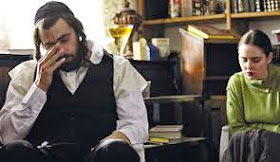As for Waltz with Bashir, it’s hard to imagine an enemy of Israel making such a searing indictment of the horror and shame of the 1982 invasion of Lebanon – and it also shows just how good animation can be if one only allows it to take on a profound and adult subject.
Now a film by an Israeli director, Rama Burshstein, has opened my eyes again, with Fill the Void. Burshstein is the first Orthodox Jew to have made a film for general distribution, and she’s merciless in the way she probes the life of an Orthodox (Haredi) community in Tel Aviv. What emerges is a harrowing picture, at least to the eyes of this Western outsider, of claustrophobia and denial of anything remotely resembling freedom of choice, above all to women. The community should naturally have the right to live its life as it wishes, but this sensitive film left me feeling “sooner you than me.”
 |
| Fill the void: powerfully grim and claustrophobic |
It’s no spoiler to tell you he survived: the film starts with his post-war existence.
 |
| Colin Firth as the Railway Man, appropriately in a train |
And then there’s Morten Tyldum’s The Imitation Game.
Not enough has yet been said about Alan Turing. We tend to talk most about the work he did breaking the German Enigma code during World War Two. What we perhaps don’t appreciate enough is that the principles on which he based the machines which he built to crack the cypher formed the basis of computing as we now know it. As well as contributing to saving the world from potential Nazi domination, he therefore prepared it for the culture we now enjoy. And before you say “well, there’s not much to be thankful there then,” just remember that an awful lot of computing is highly beneficial, and the fact that the Tea Party or, indeed, the US Republicans generally, can make use of the internet for their own nefarious ends, is just the price we pay for a great enhancement to our lives generally.
 |
| Benedict Cumberbatch as Alan Turing with one of the machines that broke Enigma and launched modern computing |
The other code that Turing broke was society’s rejection of homosexuality that had, in his time, barely begun to recede. It wasn’t until a great reforming Labour government came to power in Britain in the 1960s, that the law against homosexuality was repealed. Too late for Turing, who fell foul of that law viciously applied by men who couldn’t begin to appreciate the quality of his genius. The experience destroyed him.
Not the least quality of the film is its portrayal of one of the policemen and his gradually awakening horror at what he has, for initially completely different motives, found himself dragged into forwarding.
Good films, all three. Perhaps not out-and-out classics, but well worth a couple of hours or so. And, if you have a couple of hours to watch any of them, you’d be unlikely to find you’ve wasted your time.
Thanks for this! With the death of Blockbuster, I've stopped watching much outside the mainstream on Sky Movies, but these films look worth searching for.
ReplyDeleteThey're worth it, I'd say - not necessarily a bundle of laughs, you understand, but with insights worth seeing deployed.
ReplyDelete